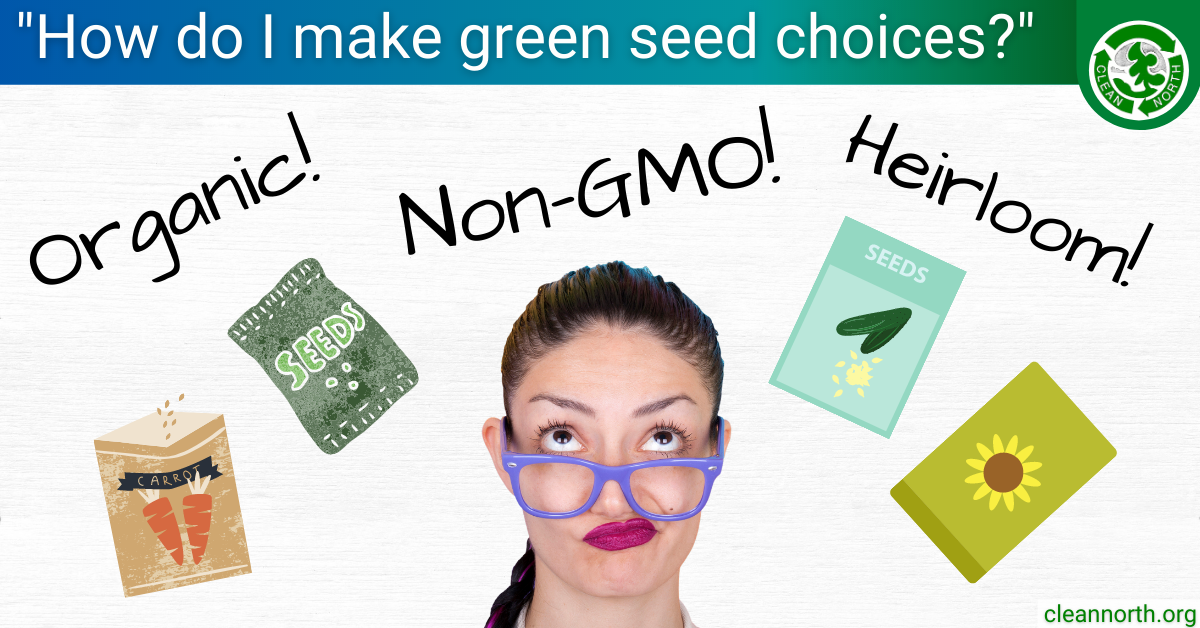
Choosing seeds can be overwhelming. There’s so much information out there, and not all of it is accurate! So we are offering up some tips for choosing seed in a way that will help you be a greener gardener without spending more money unecessarily.
GMO-free
Seeds classified as genetically modified are altered at the cellular level in a laboratory. We ordinary folks cannot buy GMO seeds — only farmers and large commercial agencies can. Labelling seeds as GMO-free is a marketing gimmick, like labelling a product that never got near a grain as gluten-free. Bottom line: Don’t worry about seeds’ GMO status. It’s not an issue.
Heirloom
The definition of heirloom seeds ranges from those for varieties common before World War II to those for varieties at least 50 years old. Heirloom plants often have interesting histories or unique traits. For example, Gaspé corn is an early-maturing variety originated with the Mi’kmaq people living in what is now eastern coastal Canada. Heirloom vegetable varieties may have unusual shapes (romanesco broccoli resembles a Christmas tree), colours (black and blue tomatoes; red, white, and purple carrots; yellow watermelon) and flavours (lemon cucumbers!).
Their down side? They tend to be less reliable and more susceptible to insects and diseases.
Bottom line: Historic, fun and interesting, help maintain biodiversity, more fussy.
Organic
Organic seeds are harvested from plants grown on an organic farm. Their main selling point is they are grown without synthetic chemicals. Because they have to survive without synthetic chemicals backing them up, plants from organic seed may be better adapted to fighting off insects, disease, and other stressors. On the other hand:
- Organic doesn’t always equal chemical-free as organic farms can use organic chemical treatments.
- Organic seeds are not treated with fungicide so their seedlings may be more susceptible to damping off.
- If you buy organic seeds but do not practice organic gardening, you’ve spent more yet are thwarting the seeds’ objective: To create an organic plant and garden.
Bottom line: Organic seeds are fine, and buying them supports organic farmers, but they cost more and safer food is not guaranteed.
Hybrid
Most seeds you see at big box stores and garden centres are hybrids—neither organic nor heirloom. Their parent plants were cross-bred for traits such as bright colour, long shelf life, or disease resistance (traditional plant breeding, not genetic engineering).
The down side of some hybrids? Flavour and texture are sacrificed—today’s mushy, mealy red delicious apple is an example of hybridization gone awry. The sungold tomato, on the other hand, is a hybrid yet prized as one of the best-tasting cherry tomatoes ever!
Another hybrid issue: If you collect seed from them, you aren’t guaranteed to get the same plant in the next generation. But hybrid seeds are generally cheap and still produce more delicious and healthier food than you can buy at the grocery store.
Bottom line: May be less interesting than heirloom varieties—but more reliable/affordable.
A few more considerations…
- Before you buy seeds/bedding plants, decide what you value most:
- Having fun by exploring the history of heirloom varieties?
- Producing a lot of food with a minimum of effort?
- Growing organically and supporting organic farmers?
- All or some of the above?
- You can buy seeds that are neither organic nor heirloom and still be green if you use sustainable growing practices like minimizing use of synthetic chemicals, using rain barrels, applying mulch, planting native species, attracting native pollinators, using locally adapted seed, etc.
- Seeds treated with neonicotinoid insecticides are a bad idea—these chemicals can harm bees and other pollinators that visit the plant. Most seeds sold to backyard gardeners are unlikely to have a neonic coating, but it only takes a minute to check a company’s website. Any reputable seed company will be open about what their seeds are treated with.
- Sometimes products marketed as “green” (including organic products) are sold by companies with poor environmental track records. If you want to go organic, be sure to check out the company’s reputation.
- Buying allegedly organic or heirloom seeds from a stranger on the internet is risky. You might not get what’s advertised.
- Buying seeds shipped from other countries can give a lift to invasive plant diseases that lurk in seeds. And the seeds themselves could be from invasive plants.
- Be especially wary of seeds that look too good to be true, for example, seeds for blue strawberries from China. They are unlikely produce blue strawberries, may not be from strawberries at all, and could be coated in toxic substances.
We suggest buying seeds from reputable Canadian sources and local garden centres where experts can advise you on the best brands to meet your gardening objectives. Two seed sellers in our region are Northern Wildflowers/Cutleaf Seeds and The Superior Gardener.
You can also get locally produced seed through the Sault Ste. Marie Horticultural Society’s annual seed swapping event (see their Facebook page). Or join the Seeds of Change Facebook group to chat with like-minded local gardeners and get recommendations for seed sources.
Questions? Contact us at info@cleannorth.org.




